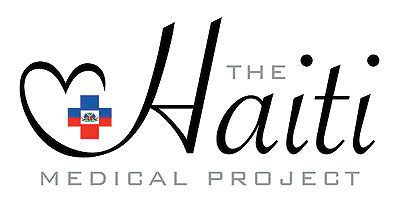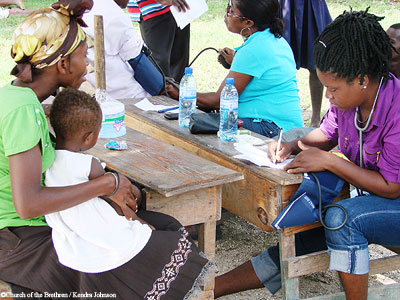 By Tyler Roebuck
By Tyler Roebuck
The Haiti Medical Project began as a partnership of American and Haitian Brethren responding to health needs in the wake of a devastating earthquake in 2010. In the time since, the project has grown tremendously with the help of grants from the Global Food Initiative (formerly the Global Food Crisis Fund) and the Royer Family Foundation, and the drive of passionate individuals from both the Church of the Brethren and L’Eglise des Freres Haitiens (Church of the Brethren in Haiti).
The ministry has expanded from solely medical treatment to include maternal care education and aid, clean water projects, and–recently–dispensaries for low-cost over-the-counter medications.
Visitation from Project Global Village
“Next month, Project Global Village [a Church of the Brethren supported ministry in Honduras] is sending four people to Haiti to work with our group,” said Dale Minnich, interim general secretary of the Church of the Brethren and active supporter of the Haiti Medical Project. “They will be there for six days in August, going out into the various communities and seeing them in action, then critiquing them.”
The Haiti Medical Project intended to send a team to Honduras, but the US government denied their travel visas. Flights to Honduras from Haiti route through Miami, Florida.
Medicinal dispensaries
In search of a more cost-effective yet meaningful method of serving the Haitian people, the project is pursuing the establishment of medicinal dispensaries in several of the communities. “The central idea,” Minnich wrote in a report to the Royer Family Foundation, “is to make the most commonly needed medications available at quite modest cost, right down the road in one’s own community.” There are currently 11 dispensaries across the country, 8 of which are in remote communities that would otherwise take multiple days of travel to reach.

Medical staff with patients at a mobile clinic of the Haiti Medical Project
Mobile clinics
Haitian Brethren churches have been key participants in promoting and arranging for the clinics. Several communities have emerged as primary sites where clinics are scheduled about quarterly. Today, there are 48 clinics annually, nearly 1 every weekend throughout the year. The Haiti Medical Project estimates that it served more than 8,000 patients in 2015, with the largest mobile clinic in Acajou treating 503 patients in one day.
Water projects
Presently, there are three water projects in service, in the communities of Acajou, Morne Boulage, and St. Louis du Nord. Six more currently are undergoing studies by project staff and local “Drinking Water” committees. “Moving such projects is a slow process requiring much careful work in advance and solid involvement of local leaders to insure that whatever system is installed has committed persons caring for it over time,” according to Minnich. The project in St. Louis du Nord currently provides safe water to more than 300 school children and the community surrounding them.

Maternal care
“One of the opportunities we have in communities like our target areas is that mothers generally do not have employment opportunities outside the home,” Minnich reported. “Their primary responsibility is to care for their family and to manage home and garden. These mothers are highly motivated to learn how to improve the health and diet of their children.”
The project is addressing these women in two different ways. Monthly meetings are offered that educate mothers on nutrition, maternal care, birth control, and basic hygiene. These meetings target pregnant mothers. In 57 of such meetings, more than 540 participants have attended.
Women with children up to five years of age can bring their child to a regularly scheduled meeting to have the child’s growth progress assessed, and receive multivitamins if the child is falling behind the norm. Ten communities are being served with this type of meeting.
‘Matrones’ training
Due to scarce transportation opportunities, Haitian mothers often are forced to have children without any medical attention. “Haiti Medical Project is partnering with another [Brethren-related] agency, Midwives for Haiti, to train our community development nurses in how to lead a short course for local birth attendants to help them sharpen their birthing skills, learn the basics of good sanitation, learn about problem situations they may face, and learn where to get emergency help,” Minnich reported. These women, called “Matrones,” serve in 9 of Haiti’s communities, and to date 69 have been trained.
For more information about the Haiti Medical Project: www.brethren.org/haiti-medical-project
— Tyler Roebuck is a student at Manchester University in North Manchester, Ind., and a Ministry Summer Service intern with the Church of the Brethren communications.